
The 2011 United Nations Security Council election was held on 21 and 24 October 2011 during the Sixty-sixth session of the United Nations General Assembly, held at United Nations Headquarters in New York City. The General Assembly elected Azerbaijan, Guatemala, Morocco, Pakistan, and Togo, as the five new non-permanent members of the UN Security Council for two-year mandates commencing on 1 January 2012. Azerbaijan was elected after 17 rounds on 24 October, while the other four new members were chosen on 21 October.

The 2013 United Nations Security Council election was held on 17 October 2013 during the 68th session of the United Nations General Assembly, held at United Nations Headquarters in New York City. The Assembly elected Chad, Chile, Lithuania, Nigeria, and Saudi Arabia for five non-permanent seats on the UN Security Council for two-year mandates commencing on 1 January 2014. The following day, Saudi Arabia announced that it was declining the seat, accusing UNSC of using "double standards" and being unable to resolve important issues in the Middle East. A second round of voting therefore took place on 6 December, in which Jordan was elected to the council in lieu of Saudi Arabia.
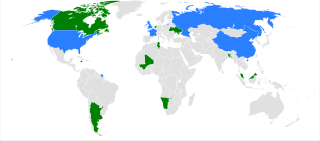
The 1999 United Nations Security Council election was held on 14 October 1999 during the Fifty-fourth session of the United Nations General Assembly, held at United Nations Headquarters in New York City. The General Assembly elected Bangladesh, Jamaica, Mali, Tunisia, and Ukraine, as the five new non-permanent members of the UN Security Council for two-year mandates commencing on 1 January 2000. Notably, Ukraine was elected to the Council for the first time as an independent nation.

The 1993 United Nations Security Council election was held on 29 October 1993 during the Forty-eighth session of the United Nations General Assembly, held at United Nations Headquarters in New York City. The General Assembly elected Argentina, the Czech Republic, Nigeria, Oman, and Rwanda, as the five new non-permanent members of the UN Security Council for two-year mandates commencing on 1 January 1994. Oman and Rwanda were elected for the first time ever, while the Czech Republic was elected for the first time as a separate country after the dissolution of Czechoslovakia.
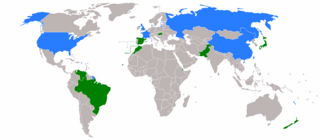
The 1992 United Nations Security Council election was held on 27 October 1992 during the Forty-seventh session of the United Nations General Assembly, held at United Nations Headquarters in New York City. The General Assembly elected Brazil, Djibouti, New Zealand, Pakistan, and Spain, as the five new non-permanent members of the UN Security Council for two-year mandates commencing on 1 January 1993.

The 1991 United Nations Security Council election was held on 16 October 1991 during the Forty-sixth session of the United Nations General Assembly, held at United Nations Headquarters in New York City. The General Assembly elected Cape Verde, Hungary, Japan, Morocco, and Venezuela, as the five new non-permanent members of the UN Security Council for two-year mandates commencing on 1 January 1992.
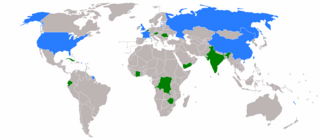
The 1990 United Nations Security Council election was held on 1 November 1990 during the Forty-fifth session of the United Nations General Assembly, held at United Nations Headquarters in New York City. The General Assembly elected Austria, Belgium, Ecuador, India, and Zimbabwe, as the five new non-permanent members of the UN Security Council for two-year mandates commencing on 1 January 1991.
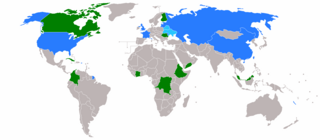
The 1989 United Nations Security Council election was held on 18 October 1989 during the Forty-fourth session of the United Nations General Assembly, held at UN Headquarters in New York City. The General Assembly elected Côte d'Ivoire, Cuba, Romania, South Yemen, and Zaire, as the five new non-permanent members of the UN Security Council for two-year mandates commencing on 1 January 1990. This was the first time Yemen was elected to the Council, as Yemeni unification occurred during South Yemen membership.
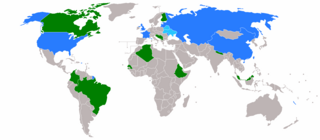
The 1988 United Nations Security Council election was held on 26 October 1988 during the Forty-third session of the United Nations General Assembly, held at United Nations Headquarters in New York City. The General Assembly elected Canada, Colombia, Ethiopia, Finland, and Malaysia, as the five new non-permanent members of the UN Security Council for two-year mandates commencing on 1 January 1989.

The 1986 United Nations Security Council election was held on 16 October 1986 during the Forty-first session of the United Nations General Assembly, held at United Nations Headquarters in New York City. The General Assembly elected Argentina, Italy, Japan, West Germany, and Zambia, as the five new non-permanent members of the UN Security Council for two-year mandates commencing on 1 January 1987.

The 1984 United Nations Security Council election was held from 22 October to 18 December 1984 during the Thirty-ninth session of the United Nations General Assembly, held at United Nations Headquarters in New York City. The General Assembly elected Australia, Denmark, Madagascar, Thailand, and Trinidad and Tobago, as the five new non-permanent members of the UN Security Council for two-year mandates commencing on 1 January 1985. Madagascar, Thailand and Trinidad and Tobago were elected to Council for the first time.

The 1981 United Nations Security Council election was held on 15 October 1981 during the Thirty-sixth session of the United Nations General Assembly, held at United Nations Headquarters in New York City. The General Assembly elected Guyana, Jordan, Poland, Togo, and Zaire, as the five new non-permanent members of the UN Security Council for two-year mandates commencing on 1 January 1982. Togo and Zaire were elected for the first time.
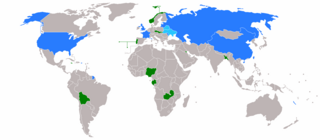
The 1978 United Nations Security Council election was held on 10 November 1978 during the Thirty-third session of the United Nations General Assembly, held at United Nations Headquarters in New York City. The General Assembly elected Bangladesh, Jamaica, Norway, Portugal, and Zambia, as the five new non-permanent members of the UN Security Council for two-year mandates commencing on 1 January 1979. Notably, Bangladesh, Jamaica and Portugal were elected members of the council for the first time.

The 1975 United Nations Security Council election was held on between 20 October and 23 October 1975 during the Thirtieth session of the United Nations General Assembly, held at United Nations Headquarters in New York City. The General Assembly elected Dahomey, Libya, Pakistan, Panama, and Romania, as the five new non-permanent members of the UN Security Council for two-year mandates commencing on 1 January 1976. Benin and Libya were elected for the first time.
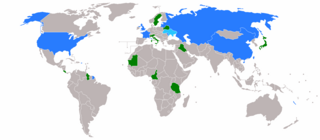
The 1974 United Nations Security Council election was held on 11 October 1974 during the Twenty-ninth session of the United Nations General Assembly, held at United Nations Headquarters in New York City. The General Assembly elected Guyana, Italy, Japan, Sweden, and Tanzania, as the five new non-permanent members of the UN Security Council for two-year mandates commencing on 1 January 1975. Both Guyana and Tanzania were elected to the council for the first time.

The 1973 United Nations Security Council election was held on 15 October 1973 during the Twenty-eighth session of the United Nations General Assembly, held at United Nations Headquarters in New York City. The General Assembly elected the Byelorussian SSR, Cameroon, Costa Rica, Iraq, and Mauritania, as the five new non-permanent members of the UN Security Council for two-year mandates commencing on 1 January 1974. This was the first election of Cameroon, Costa Rica and Mauritania and the only election of Byelorussian SSR into the council.

The 1971 United Nations Security Council election was held on 23 November 1971 during the Twenty-sixth session of the United Nations General Assembly, held at United Nations Headquarters in New York City. The General Assembly elected Guinea, India, Panama, Sudan, and Yugoslavia, as the five new non-permanent members of the UN Security Council for two-year mandates commencing on 1 January 1972. It was the first election of Guinea and Sudan into the council.
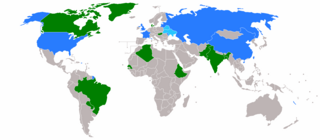
The 1967 United Nations Security Council election was held on 6 November 1967 during the Twenty-second session of the United Nations General Assembly, held at United Nations Headquarters in New York City. The General Assembly elected Algeria, Hungary, Pakistan, Paraguay, and Senegal, as the five new non-permanent members of the UN Security Council for two-year mandates commencing on 1 January 1968. Algeria and Senegal saw their first election into the council.

The 1966 United Nations Security Council election was held on 11 November 1966 during the Twenty-first session of the United Nations General Assembly, held at United Nations Headquarters in New York City. The General Assembly elected Brazil, Canada, Denmark, Ethiopia, and India, as the five new non-permanent members of the UN Security Council for two-year mandates commencing on 1 January 1967.

The 1979 United Nations Security Council election was held from 26 October 1979 to 7 January 1980 during the Thirty-fourth session of the United Nations General Assembly, held at United Nations Headquarters in New York City. The General Assembly elected East Germany, Mexico, Niger, the Philippines, and Tunisia, as the five new non-permanent members of the UN Security Council for two-year mandates commencing January 1980. Taking 155 rounds of voting to resolve, it remains the longest Security Council election in history. Additionally, this was the first time Niger was elected and the only time East Germany was elected member of the Council.




















